The amount of computers nefariously “hijacked” by malicious hackers to spew out spam and spread viruses has soared almost 30% in the twelve months, according to security firm Symantec.
 The security bigwigs reported that more than six million bot-infected computers were detected during the second half of 2006, with over a third of all computer attacks originating from US-based PCs.
The security bigwigs reported that more than six million bot-infected computers were detected during the second half of 2006, with over a third of all computer attacks originating from US-based PCs.
Despite this growth, the number of bot ‘command-and-control’ servers shrunk by around 25% to 4,700, pointing to a more centralised system for unleashing bot-tastic attacks.
Symantec blames the rise in infected computers on the growing online population of countries like China and Spain, with Ollie Whitehouse, senior consulting services director, commenting, “There is almost an educational curve that the users and service providers have to go through. Unfortunately when certain countries go through rapid increases in connectivity and availability of technology that curve is not always kept up.”
 The company also noted that ‘underground economy servers’ were being being used by dodgy perps to flog stolen personal information, including credit cards, bank cards, PIN numbers and other forms of ID.
The company also noted that ‘underground economy servers’ were being being used by dodgy perps to flog stolen personal information, including credit cards, bank cards, PIN numbers and other forms of ID.
Just over half of all identity theft-related data breaches were also found to have resulted from the loss or theft of computer hardware (like a laptop, USB memory stick, removable storage).
“As cyber criminals become increasingly malicious, they continue to evolve their attack methods to become more complex and sophisticated in order to prevent detection,” warned Arthur Wong, senior vice president, Symantec Security Response and Managed Services.
“End users, whether consumers or enterprises, need to ensure proper security measures to prevent an attacker from gaining access to their confidential information, causing financial loss, harming valuable customers, or damaging their own reputation,” he added.
Via
 Music mega retailed HMV has announced that it will start selling “DRM-free” digital downloads from September 2007.
Music mega retailed HMV has announced that it will start selling “DRM-free” digital downloads from September 2007. The UK Government has been exposed to a very embarrassing technology related problem – revealing the personal details, and travel plans, of people hoping to visit the UK from India.
The UK Government has been exposed to a very embarrassing technology related problem – revealing the personal details, and travel plans, of people hoping to visit the UK from India.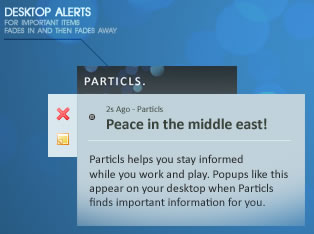 Information overload is a buzz phrase which has been getting a lot of use recently. It refers to the enormous amount of information which we now consume (largely because of the level of accessibility to content which the Internet gives us), and the challenges that that creates. Another important issue is the Long Tail, as recognised by Chris Anderson, and the way that relates to content. In other words, there is now far more information available which makes discoverability much harder.
Information overload is a buzz phrase which has been getting a lot of use recently. It refers to the enormous amount of information which we now consume (largely because of the level of accessibility to content which the Internet gives us), and the challenges that that creates. Another important issue is the Long Tail, as recognised by Chris Anderson, and the way that relates to content. In other words, there is now far more information available which makes discoverability much harder. The security bigwigs reported that more than six million bot-infected computers were detected during the second half of 2006, with over a third of all computer attacks originating from US-based PCs.
The security bigwigs reported that more than six million bot-infected computers were detected during the second half of 2006, with over a third of all computer attacks originating from US-based PCs. The company also noted that ‘underground economy servers’ were being being used by dodgy perps to flog stolen personal information, including credit cards, bank cards, PIN numbers and other forms of ID.
The company also noted that ‘underground economy servers’ were being being used by dodgy perps to flog stolen personal information, including credit cards, bank cards, PIN numbers and other forms of ID. In the interview with German weekly magazine Focus, published today, she poses the following question, “”Do you think it’s fine that a CD plays in all CD players but that an iTunes song only plays in an iPod?” It’s followed by a couple of words that are going to make uncomfortable reading for Apple, “I don’t. Something has to change.”
In the interview with German weekly magazine Focus, published today, she poses the following question, “”Do you think it’s fine that a CD plays in all CD players but that an iTunes song only plays in an iPod?” It’s followed by a couple of words that are going to make uncomfortable reading for Apple, “I don’t. Something has to change.” We’ve been bombarded by the smug, highly slapable face of the Mac bloke in Apple’s omnipresent advertising campaign telling us how incredibly secure Macs are, but an independent researcher begs to differ.
We’ve been bombarded by the smug, highly slapable face of the Mac bloke in Apple’s omnipresent advertising campaign telling us how incredibly secure Macs are, but an independent researcher begs to differ.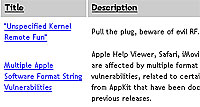 Finisterre says he started the project in response to Apple owners’ blasé attitude to security, commenting, “Try calling any Apple store and ask any sales rep what you would do with regard to security, ask if there is anything you should have to worry about?
Finisterre says he started the project in response to Apple owners’ blasé attitude to security, commenting, “Try calling any Apple store and ask any sales rep what you would do with regard to security, ask if there is anything you should have to worry about? Claiming that Apple hadn’t been too interested in opening a dialogue about security matters, Finisterre said that things were now changing for the better.
Claiming that Apple hadn’t been too interested in opening a dialogue about security matters, Finisterre said that things were now changing for the better.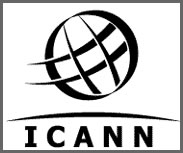 The infrastructure stands at the middle of the DNS structure that translates domain names into their numeric IP addresses. Effectively acting as an address book.
The infrastructure stands at the middle of the DNS structure that translates domain names into their numeric IP addresses. Effectively acting as an address book.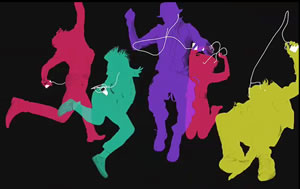 Norway has declared iTunes to be illegal because it doesn’t allow songs downloaded from the online music store to be played on any other equipment except their own, today’s FT reported.
Norway has declared iTunes to be illegal because it doesn’t allow songs downloaded from the online music store to be played on any other equipment except their own, today’s FT reported.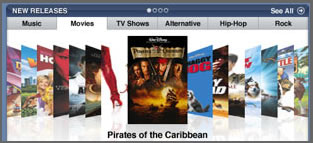 The original complaint was made by Torgeir Waterhouse, senior advisor to the Norwegian Consumer Council. He told the FT that “he was in negotiations with pan_European consumer groups to present a unified position on iTunes’ legality.”
The original complaint was made by Torgeir Waterhouse, senior advisor to the Norwegian Consumer Council. He told the FT that “he was in negotiations with pan_European consumer groups to present a unified position on iTunes’ legality.” They’ve been compiling stats on this using
They’ve been compiling stats on this using 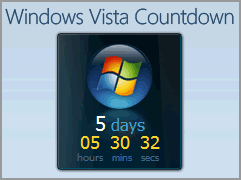 The real figure of pirated copies is likely to be far higher than the 22.3% figure quoted, as it’s only the innocent/daft who would let their computer tell Microsoft that they are using a piece a software they bought from the bloke at the car boot sale for a fiver.
The real figure of pirated copies is likely to be far higher than the 22.3% figure quoted, as it’s only the innocent/daft who would let their computer tell Microsoft that they are using a piece a software they bought from the bloke at the car boot sale for a fiver. The influential UK thinktank, Institute for Public Policy Research (ippr), announced on Sunday that they thought that UK copyright law should be updated to include a “private right to copy,” clause to legalising the personal copying of CDs to portable music players. They also recommend that there should be no extension to the current 50-years copyright term.
The influential UK thinktank, Institute for Public Policy Research (ippr), announced on Sunday that they thought that UK copyright law should be updated to include a “private right to copy,” clause to legalising the personal copying of CDs to portable music players. They also recommend that there should be no extension to the current 50-years copyright term.